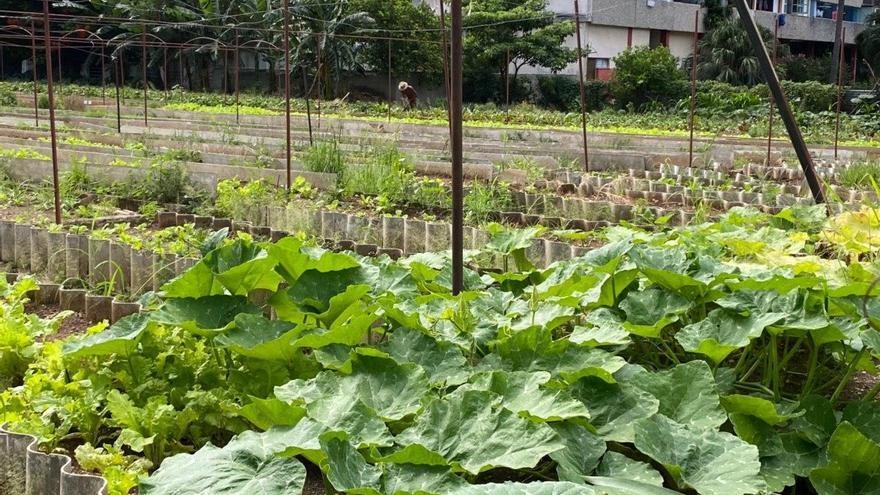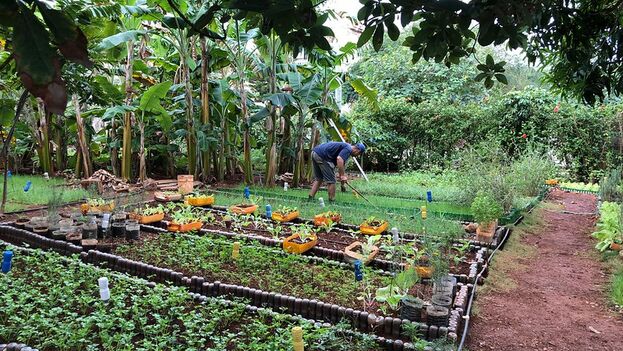
![]() 14ymedio, Marcelo Hernández, Havana, July 14, 2020 – Boris grows cucumbers, some varieties of garlic and aromatic herbs on the patio of his house in La Lisa, Havana. He says he’s preparing “for what’s coming, which will be hard,” so he’s filled about 20 plastic containers, which used to hold paint, with a little earth and gravel, and the incentive of necessity.
14ymedio, Marcelo Hernández, Havana, July 14, 2020 – Boris grows cucumbers, some varieties of garlic and aromatic herbs on the patio of his house in La Lisa, Havana. He says he’s preparing “for what’s coming, which will be hard,” so he’s filled about 20 plastic containers, which used to hold paint, with a little earth and gravel, and the incentive of necessity.
“I’m not going back to living in another Special Period,” he explains to 14ymedio. “When I was 12 they sold some little chicks that we had to raise at home, but they all died a little later because in my family there are mechanics, engineers and even a dentist, but no one knew how to grow food or raise farm animals.
Once he noticed that the present crisis was going to get worse, this graduate in geography, who works as a waiter in a paladar (privately-owned home restaurant) decided to learn the A-B-Cs of creating a garden on his patio, in a space of about four or five meters with a concrete soil, at the end of a hallway with several apartments on each side. Now he spends most of his time there.
In the last few months, as the shortage of products grew and Boris’ family spent more and more time finding certain condiments, he planted oregano. “It grows anywhere, so it’s a good way to prove that I can do it.”
“Then I added basil, garlic, several rosemary and parsley plants, which also did very well. As I felt more secure, I added cucumber and chili peppers, but I’ve had the most success with herbs for seasoning or making tea,” he says. “We can’t survive with this but at least we’ll have something to give taste and variety to the food.”
Several of his neighbors also benefit from the garden, something that has brought relief in the middle of the pandemic, with the farmers markets in the zone very short of food and the little carts almost missing from the streets because of police control. “I’ve turned into a real guajiro!” jokes the improvised farmer.
But now that he’s conquered his initial inexperience, Boris is facing other problems. “The delivery of water is what causes the most harm, because in this zone it’s been almost a week without it coming,” he laments. “I’ve had to carry water from other neighborhoods not only for the bathroom and mopping, but also for irrigation.”
Last March, the capital had 111 water supply sources damaged, 89 partially and the other 22 totally, and only one of the five water systems is in good shape, a situation that barely has changed with the passing weeks. Some neighborhoods in the capital have spent almost two weeks without receiving service.

“A garden in every house and in every neighborhood sounds very good, but when people start growing everywhere, what’s going to happen with the little water we have?” asks Boris’ neighbor, who approves of the practice of growing food but worries about the building’s cistern “drying up”. However, he admits that the garden’s garlic and chives have “saved several meals”.
“You throw a few seeds, wait a few days and there it is,” is how Felipe Agüero describes it. He’s a retired truck driver who began planting on a small parcel behind his building in Reparto Bahía in Havana. Cucumbers, aromatic herbs and several papaya plants are his greatest pride, but these days it’s the squash that is the butt of most of his neighbors’ jokes.
“I had squash before all this racket started, and it’s not one of the most interesting things to plant,” he clarifies.
Gerardo González, Vice President of the Committees for the Defense of the Revolution (CDR) and ex-spy imprisoned for years in the U.S., called for a massive planting of squash, triggering all kinds of jokes on social media. “If every CDR produces one squash and there are 138,000 CDRs in the country, then there would be 138,00 more squash,” affirms González during a visit to Camagüey.
On the official list of commercial varieties of squash that the Ministry of Agriculture maintains they are almost 20 names, but, in practice, there are six which are the most common on tables. The differences go from the form, passing to the size, the texture of the shell and even the arrangement of the seeds inside.
“You can grow squash year-round, but you have to be very careful in the months of July and August because there’s a lot of blight when it’s hot,” warns Agüero. “What I produce here is very small, but to grow it seriously, you must have good seed and keep the irrigation stable, something very difficult to do in the city.”
He waters his small garden by a hose connected to the building’s water supply. “When there’s no water it’s lost work because all the strength in the seeds can be gone in a few days, which has happened to me many times.”
“Here what I can get are seasonal herbs for cooking, but it’s clear that my family can’t live only on this,” says Agüero. “Sometimes it’s only a distraction for me, to pass a little time outside the house and think about something other than my problems, but the fear I have now is that they’re saying if you already have a garden, you don’t need to buy in the bodega (ration store).”
It’s better not to talk to Agüero about pineapple. “Anyone who asks you to plant pineapple everywhere knows nothing about agriculture,” he points out. “It’s a very aggressive plant because its leaves poke and cut,” and it’s not advisable at all to plant pineapple on a patio, a terrace or in a garden because it’s a danger for people, animals
“When I was a boy and lived in Quivicán, my father used to plant pineapple to separate the other crops, like a kind of natural barrier to prevent the cows from getting into the more sensitive crops, and also to dissuade thieves,” he remembers.
“It’s better for me to continue with my herbs to solve my problem a little, and I’ve even been able to sell some. Basil is the favorite because people use it a lot for religious cleansings,” explains Agüero. “With the money I get for the basil, I go and buy the pineapple or squash that I can’t find in the store.”
Translated by Regina Anavy
_________________
COLLABORATE WITH OUR WORK: The 14ymedio team is committed to practicing serious journalism that reflects Cuba’s reality in all its depth. Thank you for joining us on this long journey. We invite you to continue supporting us by becoming a member of 14ymedio now. Together we can continue transforming journalism in Cuba.
